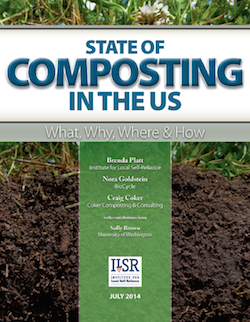Resource Library
 Success Stories
Success Stories News | 07/14/2014
News | 07/14/2014Composting reduces waste and builds healthy soil to support local food production and protect against the impacts of extreme weather, from droughts to heavy rainfall.
Read More
The San Francisco Department of the Environment maintains this list of distributors of compostable products, such as plates, cutlery, and to-go containers. Includes distributors’ contact information.
This grant includes more in-depth outreach with community members, including tracking at-home data to provide deeper insight into successes and challenges to adopting food waste reduction behaviors. The maximum grant award is up to $10,000 per organization, and must be used to support new or existing projects that address the issue of wasted food going to landfill.
Read More- Videos
Published on May 1, 2014
Food scraps become nutrient-rich compost that's used to grow crops on farms, like Terra Bella Family Farm in Alameda County.
This document provides guidance about the purchase and placement of internal recycling containers, including a short list of vendors that offer competitive pricing.
- Policies
These guidelines and tips supplement the Environmentally Preferable Purchasing Model Policy. Topics covered include implementation strategies by product category and best practices for program evaluation.
- Policies
The StopWaste Sustainable Procurement Policy Template is designed to establish your agency’s core expectations around how your agency’s purchases will support your agency’s environmental, social, and economic values. It is intended to provide overall authority and direction for action, and type of action, via the “Core Strategies”, while leaving specific “how” details to supporting resources – the Sustainable Purchasing Guides.
Read More - Reports
In 2000 and 2001, the Alameda County Waste Management Authority (ACWMA) gathered weight data on waste disposed from over 1,500 businesses comprising four commercial waste collection routes in Oakland and Hayward. In addition, the ACWMA commissioned a waste characterization study that included analysis of the composition of waste from 260 of the businesses for which weight information was collected. This report provides a summary of the study, reports on our statistical analysis of the data, and draws conclusions regarding the data’s usefulness and applicability for diversion program planning.
Read More